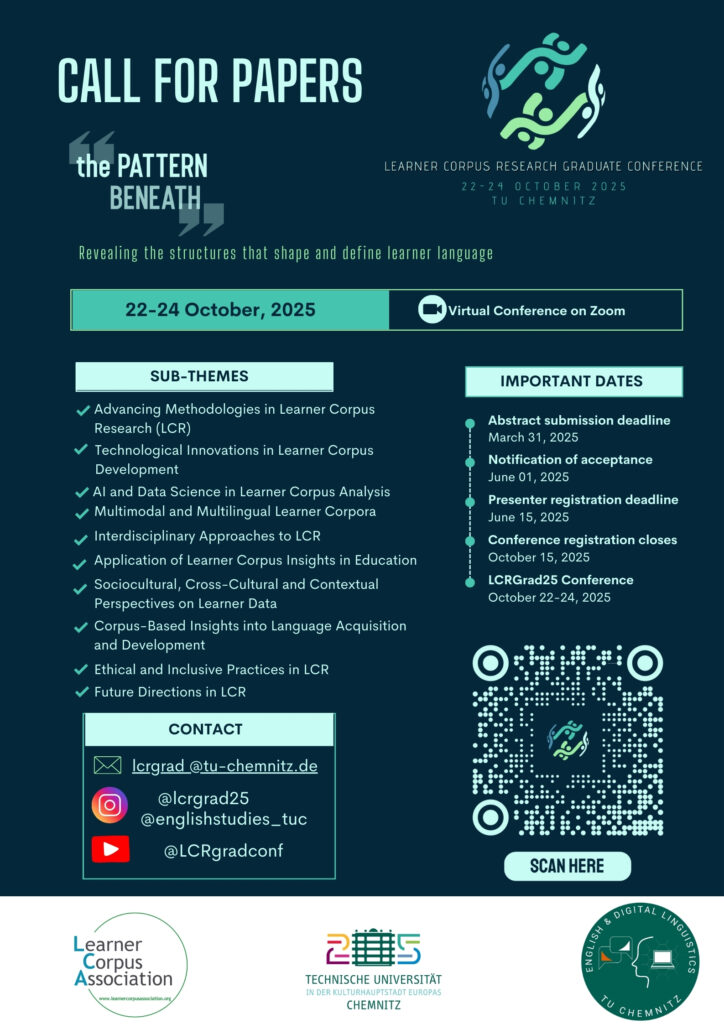Research

Here you can find my research interests:
If you wish to explore more, collaborate or obtain more information about any of my projects, please contact me.
Data Driven Learning for Children
Please check Corpish.
Learner Corpus Metadata Schema
LC Metadata Working Group Member led by UCLouvain, CLARIN and Eurac Research
Here you can find more information about the Prohject: https://clarin.eurac.edu/repository/xmlui/handle/20.500.12124/83
Visibility and Outreach Working Group, Coordinator, ongoing
Feedback and User Experience Working Group, Member, ongoing
Emotional responses to different linguistic and stylistic inputs
In this project, we aim to investigate how different linguistic and stylistic input affect emotions in human communication. The study involves various stimuli and employs eye-tracking and skin conductance analysis to shed light on the dynamics of emotional arousal through linguistic stimuli.
Project Team:
Cansu Akan (Principal Investigator)
Christina Sanchez-Stockhammer (research supervisor)
Sepideh Javdani Esfahani
Sasha Genevieve Coelho
AI in Education
The project aims to promote a research-informed, ethical, human-centered approach to AI in Education through collaboration and knowledge exchange. Working across the four pillars of design, regulation, implementation and impact, researchers at the University of Oxford will collaborate and convene with expert colleagues and key stakeholders from around the world to establish a shared research agenda. We seek to co-create a use case for AI in Education that represents best practice in quality teaching and learning.
AI in Education at Oxford University (AIEOU), Academic Partner, ongoing
PROCEED (PROcess Corpus of English in EDucation)
The Process Corpus of English in Education – PROCEED for short – started in 2017 at the University of Louvain by Prof. Dr. Gaëtanelle Gilquin and her team.
As a PROCEED partner at EDL TU Chemnitz, we contribute to the corpus by collecting data for native German learners under the supervision of Prof. Dr. Christina Sanchez-Stockhammer.
Project Team:
Marina Beccard
Cansu Akan
Katharina Scholz
Science Communication
This project investigates Science Communication for Public Platforms and the language used in the news articles, expert views and posts.
Project Team:
Cansu Akan
Sasha Coelho
Exploring English Compounds and Their Spelling
This study expands on Sanchez-Stockhammer (2018), thus, investigates the spelling of English compounds. Through the analysis of the data gathered from novels written both in American and British English, the predictive accuracy of the algorithm is tested and some systematic patterns in English compound spelling is observed.
CEFR & Processability Theory- Completed
In this project, which led to my unpublished M.A. thesis, I investigated the interface between CEFR and Processability Theory through empirical study.
Please find the abstract below.
This cross-sectional study investigates the interface between the Common European Framework of Reference (CEFR) (Council of Europe (CoE), 2001, 2017) and Processability Theory (PT) (Pienemann, 1998, 2005). The CEFR is a reference tool which classifies what a learner can or cannot do at a specific language level while learning a language. PT is a psycholinguistic approach to SLA which proposes that every L2 learner follows a developmental hierarchy when acquiring a second language and spells out “the order in which morpho-syntactic phenomena emerge in the learner’s production” (Håkansson, 2016, p. 111). While PT provides an empirical framework for learner development, the CEFR, indeed, has been criticized for lacking a sound theoretical background and SLA informed design (Alderson, 2007; Hulstijn et al., 2010; Hulstijn, 2007; Huhta et al., 2014; Little, 2007).
The aim of this empirical study is to find out a possible interface between the CEFR levels and PT stages and whether PT can inform the CEFR level rating scales that have come in for a lot of criticism due to “the missing linguistic, psycholinguistic, and sociolinguistic poles underneath”, which create a “shaky ground” (Hulstijn, 2007, p. 663). The hypothesis is that there is an interface between the CEFR levels and PT stages, but not in all. It is hypothesized that for those in which an interface is found, PT can contribute to the theoretical background of the CEFR, making it a sounder reference tool. To this end, the data for this study is elicited through communicative tasks, which are recorded for further transcription.
Informants are first assigned a CEFR level based on their oral production by four trained raters and then, are profiled by means of distributional analysis in PT framework. The results obtained through distributional analysis are implicationally scaled to diagnose PT Stages of the informants. The findings are compared and analysed qualitatively. The results are promising and confirm the hypotheses that there is an interface between PT stages and the CEFR levels. The interface seems to be more present at lower levels in comparison to higher levels. In line with this finding, it is put forward that PT has the potential the compensate for the theoretical shortcomings of the CEFR scales especially at lower levels.
Keywords: cross-sectional, Processability Theory, the CEFR, interface, stages, levels
EQUALS Quality Assurance and Accreditation of Language Programs- Completed
I initiated, managed and completed the accreditation process at Boğaziçi University School of Foreign Languages during my post as Academic Director between 2022 and 2024. Please see the output here:
https://yadyok.bogazici.edu.tr/en/accreditation
Some of the procedures and policies I created, co-created with Yusuf Cengiz or led can be found here: https://yadyok.bogazici.edu.tr/en/quality-assurance-and-accreditation-unit
There is more to it: recruitment policy, stakeholder policy, higher university management policy, and so on…
Please get in touch if you are considering to take on this challenge and need support with initiation, documentation and management of the process.
Institutional Professional Development and Systems Design- Completed
As a dedicated teacher trainer, I established a unit for ongoing teacher training and professional development for Boğaziçi University School of Foreign Languages. Together with Sinem Yılmaz Demir and Melek Aydoğan Koral, we devised and ran an exemplary professional development system.
Please see the output and get more information here: https://yadyok.bogazici.edu.tr/en/professional-development-unit-0
And a testimony here: https://yadyok.bogazici.edu.tr/sites/yadyok.boun.edu.tr/files/pdu_newsletter_5_0.pdf
Please get in touch if you are interested in knowing more about the process and the programme.
Needs Analysis for Language Learning and Teaching Design- Completed
Together with Yusuf Cengiz, we designed and completed an extensive needs analysis by giving an active ownership& agency to students, instructors and the whole faculty at Boğaziçi University in the revamping of the curriculum and materials. This was crucial to make needs match with 21st century skills and learner profiles.
The steps taken are briefly as follows:
– Freshman course syllabi in all departments at BU studied
– Analysis of language skills required, task types and exam types
– Student survey on needs and areas for improvement in teaching and learning
– NA survey and interviews with all faculty at BU
+ Global needs analysis and integration
+ Report of findings
Please get in touch if you are interested in knowing more about the process and findings.
Curriculum Renewal of an Intensive Language Program- Completed
Based on the needs analysis and earlier reports, I initiated, led and completed a thorough revision of the curriculum and task types at Boğaziçi University School of Foreign Languages between 2022-2024.
We applied Backward Curriculum Design principles in this project. Backward design is an educational planning approach where educators start with the end in mind. Richards (2013) elaborates further as follows: “Backward design starts with a careful statement of the desired results or outcomes: appropriate teaching activities and content are derived from the results of learning. This is a well-established tradition in curriculum design in general education and in recent years has re-emerged as a prominent curriculum development approach in language teaching.”
This approach ensures that instruction is directly aligned with desired learning outcomes, making education more focused and coherent. The idea is that by knowing exactly what you want students to learn, you can more effectively design the curriculum to meet those goals.
Please get in touch if you are interested in knowing more about the process or need support for renewing or designing your own curriculum.
Motion Verbs in English, Romanian and Turkish- Completed
This research project focuses on PATH and MANNER relations in S-framed and V-framed languages. Below are the research questions answered at the end of the study:
Previous research (Slobin, 1996; Özçalışkan& Slobin, 2003) on Verb- framed (V-framed) and Satellite-framed (S-framed) languages suggests that being V-framed languages Turkish and Romanian are expected to differ from S-framed language English in their description of PATH and MANNER information in motion verbs (MV). English is described as having more motion verbs in both written and oral narratives. V-framed languages have to compensate for the elaborate English lexicon by other means such as extensions (e.g. subordinated motion verbs) or reductions (e.g. omission of MANNER or PATH). (Slobin, 1996; Özçalışkan& Slobin, 2003)
1. Will the description of PATH and MANNER information in motion verbs in S-framed language English and V-framed languages Turkish and Romanian confirm this expectation? If yes, how? If no, why?
2. Are there frequent extensions in the translations to compensate for the richness of expression in English? Can a pattern be found?
3. Are there reductions in the translations? What are the reasons for them?
Project Team:
Cansu Akan
Pelin Ünal
Katrin Cismaru
TED Talks Corpora and Academic Word List- Completed
This small-scale study, titled TED Talks Corpus as a means for Teaching and Learning: The Coverage of New General Service List and New Academic Word List in TED Talks, takes a corpus-based approach and investigates the coverage of corpus-based NGSL and NAWL in TED Talks Transcripts Corpus.
Coming Soon
Coming Soon
Learner Corpus Research Graduate Conference 2025 (LCRGrad25)

A virtual conference, under the aegis of the Learner Corpus Association .
Hosted by the Chair of English and Digital Linguistics, Chemnitz University of Technology, Germany in 22-23-24 October 2025.
Official Website: https://lcrgrad2025.tu-chemnitz.de
Conference Chair:
Cansu Akan
Conference Committee:
Christina Sanchez-Stockhammer
Marina Beccard
Sasha Coelho
Sepideh Javdani Esfahani
Mina Raeisi Nafchi

Linguistic Data Visualization & R Summer School
A two-day hybrid summer school (July 23&24, 2025) with Prof. Antony Unwin, co-editor of the Handbook of Data Visualization (Springer 2008) and author of Graphical Data Analysis with R (Routledge 2015) and Getting (more out of) Graphics: Practice and Principles of Data Visualisation (Routledge 2024).
Summer school concentrates on what graphics are best suited for the visualisation of particular types of linguistic data and how to produce such graphics using the free software R.
Summer school team
Antony Unwin, Christina Sanchez-Stockhammer, Sasha Coelho, Cansu Akan (online moderator), Isabell Nitschmann
Language in Fantastic Film Worlds: Exploring Fictional Telecinematic Discourse
Language in Fantastic Film Worlds: Exploring Fictional Telecinematic Discourse
Conference chairs: Christian Hoffmann (University of Augsburg), Christina Sanchez-Stockhammer (Chemnitz University of Technology), Christoph Schubert (University of Vechta)
Local organising committee: Cansu Akan & Isabell Nitschmann
Official Website: https://www.tu-chemnitz.de/phil/english/sections/edling/research/filmwords.php
Poster design, Cansu Akan

